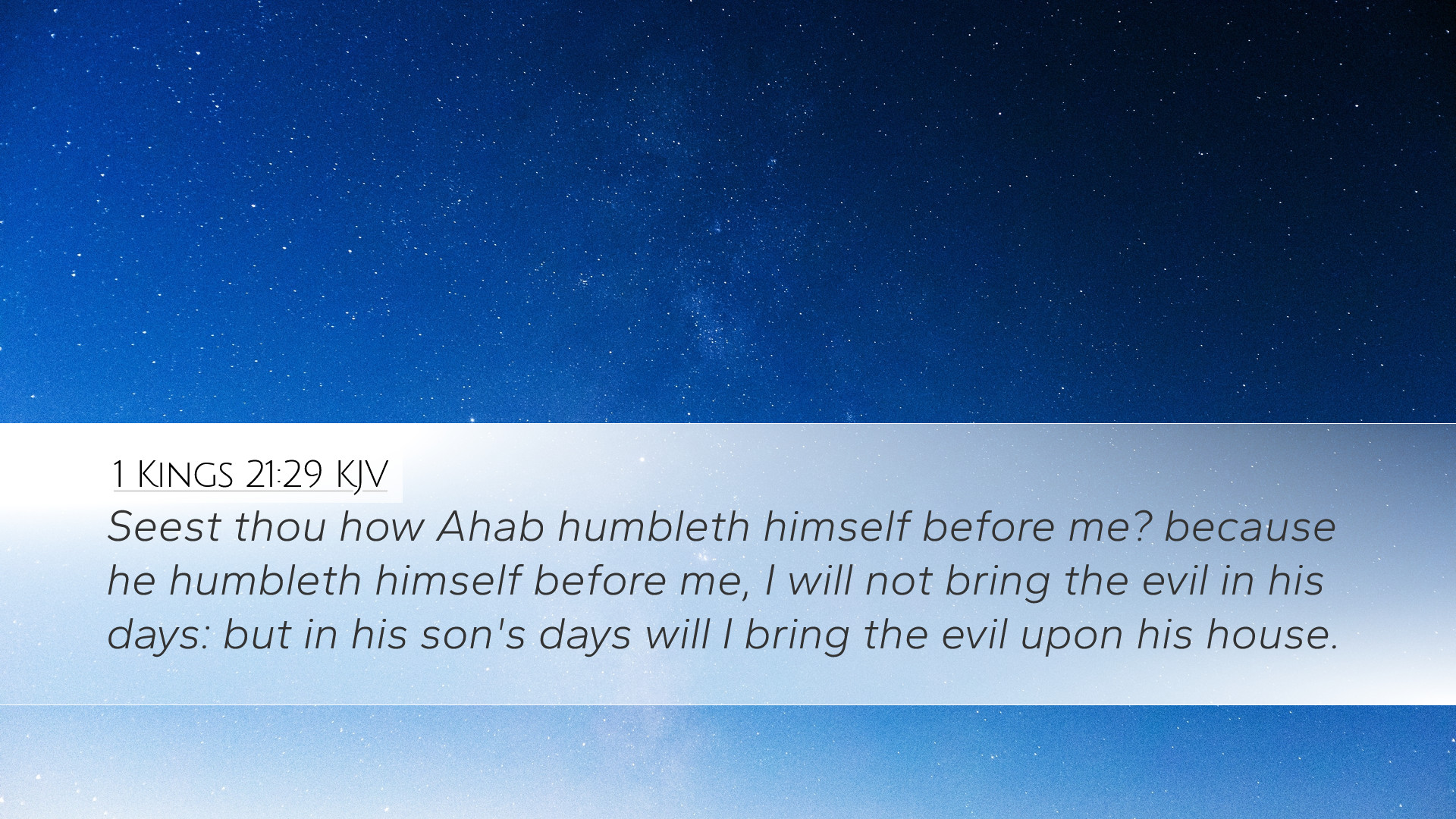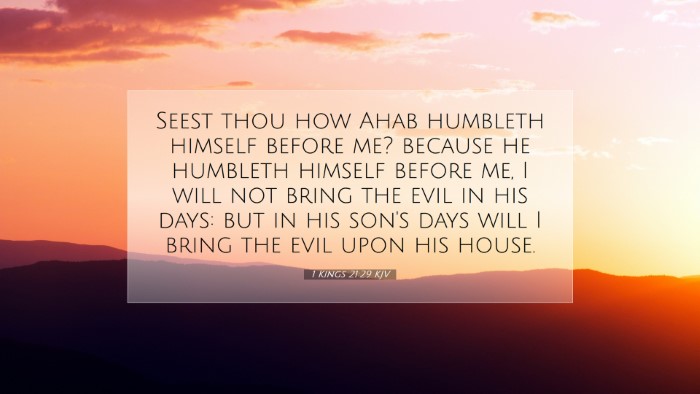Commentary on 1 Kings 21:29
Verse: "See how Ahab has humbled himself before Me. Because he has humbled himself before Me, I will not bring the disaster in his days; but I will bring the disaster upon his house in the days of his son." (1 Kings 21:29, NASB)
Introduction
This verse follows a critical point in the narrative of Ahab, the king of Israel, who was known for his disobedience and moral failings, particularly as they relate to the infamous episode of Naboth’s vineyard. Here, we see a pivotal moment where God, through the prophet Elijah, acknowledges Ahab's unusual humility and repentance.
Contextual Background
The context of this passage is vital to understanding its implications. Ahab's reign was marked by idolatry, particularly the worship of Baal, heavily influenced by his wife, Jezebel. The confrontation with Elijah over Naboth’s vineyard served as a catalyst for Ahab's recognition of his wrongdoing.
Understanding Humility
Ahab's humility, although seemingly fleeting and self-serving, is noteworthy. His act of repentance underscores a critical biblical theme: God's mercy in response to genuine contrition. This humility was not typical for Ahab, a king who often acted from a place of power and arrogance.
Insights from Public Domain Commentaries
Matthew Henry's Commentary
Matthew Henry captures the essence of Ahab's humility by stating that it is remarkable, given Ahab's previous arrogance and sinful lifestyle. Henry comments that God recognizes the shift in Ahab’s heart, highlighting divine grace in acknowledging even a modicum of repentance. He suggests that Ahab's actions, while not entirely pure, provided enough ground for God to delay judgment. This reflects a broader theme of grace throughout Scripture, where even the least deserving find mercy.
Albert Barnes' Notes on the Bible
Barnes emphasizes the significance of Ahab's acknowledgment of wrongdoing. He describes the importance of humility before God, asserting that while Ahab's confession was late, it was necessary for God's mercy to have any effect. Barnes points out that God’s delay in punishment reveals His willingness to forgive and His desire for repentance above all else. Consequently, the judgment upon Ahab's house would be delayed until after Ahab's reign, serving as a reminder that consequences can span beyond one's immediate actions.
Adam Clarke's Commentary
Adam Clarke provides a theological reflection on divine justice and mercy. He notes that the contrast between Ahab’s public persona and his private repentance illustrates the complex nature of human behavior. Clarke remarks that God's compassion is not arbitrary but contingent upon the genuineness of contrition. Furthermore, Clarke discusses the continuity of divine justice, emphasizing that while punishment was guaranteed for Ahab's sins, God, in His grace, hesitated to execute it during Ahab’s lifetime. This teaches a profound lesson about the nature of accountability and the hope inherent in repentance.
Theological Implications
The theological implications of 1 Kings 21:29 are vast. The mercy extended to Ahab serves as a striking example of God's willingness to relent from sending disaster upon those who repent, even if their repentance is not perfectly motivated. This narrative thus highlights several key themes:
- The Nature of Repentance: Genuine repentance can lead to divine mercy, showing that God is more interested in the heart's posture than mere ritual.
- Divine Justice and Mercy: God's justice is tempered by mercy, allowing for the possibility of redemption even for those with a severe moral record.
- The Consequences of Sin: While immediate consequences may be delayed upon repentance, the ultimate judgment is still inescapable, affecting future generations.
Conclusion
In summary, 1 Kings 21:29 serves as a profound reminder of the complexities of divine justice and mercy. Ahab’s fleeting moment of humility showcases the potential for transformation within even the most flawed individuals. Pastors and theologians can draw on this passage to illustrate the power of repentance and God’s readiness to forgive, as well as the importance of understanding the long-term implications of sin and the profound mercy of God. As one navigates the narratives of the Old Testament, this verse encourages a deep reflection on our own humility before God.


